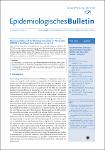Recommendations of the Standing Committee on Vaccination (STIKO) at the Robert Koch Institute – 2017/2018
Robert Koch-Institut
The Standing Committee on Vaccination (STIKO) is an independent expert committee, consisting of 12 to 18 members, as stipulated in the Infection Against Protection Law [Infektionsschutzgesetz (IfSG)]. The members are appointed by the German Federal Ministry of Health in consultation with the federal state health authorities for a period of 3 years. In accordance with the IfSG the committee provides recommendations on vaccinations and other measures for the specific prophylaxis of communicable diseases. When developing a new vaccination recommendation the STIKO conducts a medical and epidemiological risk-benefit assessment based on the best available evidence. This means beyond individual aspects the benefit of the vaccination at population level (e. g. expected epidemiological effects of the vaccination) is taken into account. STIKO recommendations serve the federal health authorities as a basis for their public recommendations. Following Volume V of the Social Insurance Code ([Sozialgesetzbuch Fünftes Buch (SGB V)] the STIKO recommendations are also the basis for the decision of the Joint National committee [Gemeinsamer Bundesausschuss (G-BA)] whether the costs of the vaccination are covered by the statutory health insurance. Vaccinations are among the most effective and significant medical measures. Modern vaccines are well tolerated, and irreversible serious adverse events (SAE) are observed only in very rare cases. The immediate goal of vaccination is to protect an individual from a specific disease. Given a high level of acceptance within the population high vaccination coverage rates can be attained. Consequently, it is possible to achieve regional elimination of single pathogens, and eventually to eradicate them worldwide. Elimination of measles, rubella, and poliomyelitis are declared and achievable goals of national and international health policy. In Germany vaccinations and other means of specific prophylaxis are “publicly recommended” by the health authorities of the federal states on the basis of the STIKO recommendations according to § 20 (3) IfSG]. Compensation of vaccineinduced injury caused by “publicly recommended” vaccinations is assured by the federal states.
Files in this item
No license information

